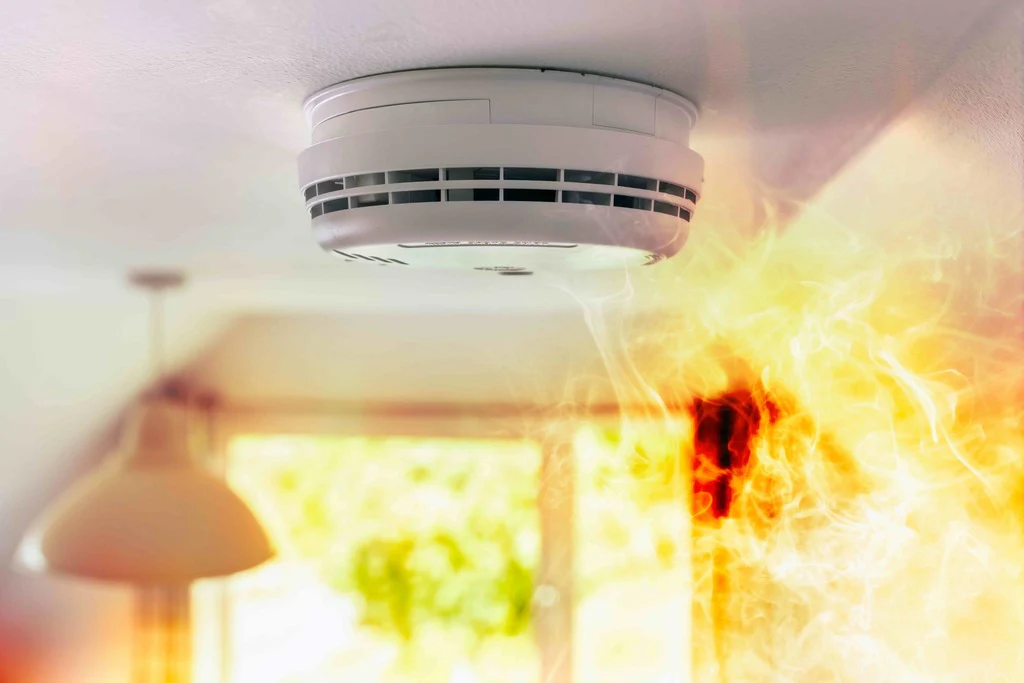
Most people think of fire as the primary danger in a house fire, but smoke inhalation is often the real killer. In fact, the majority of fire-related deaths are caused by toxic smoke rather than flames. Within just a few minutes, breathing in smoke can cause serious health effects, unconsciousness, or even death. Understanding how smoke affects your body can highlight the critical role of smoke alarms in saving lives.
What Happens When You Inhale Smoke?
Smoke is a dangerous mixture of gases, chemicals, and particles. When inhaled, it can overwhelm the body quickly. Here’s what happens step by step:
- Irritation of Airways – The first response to smoke inhalation is irritation. The eyes burn, the throat becomes scratchy, and coughing begins as the body tries to clear the airways.
- Lack of Oxygen – Smoke replaces the clean air with harmful gases. The most dangerous of these is carbon monoxide (CO), which binds to red blood cells more efficiently than oxygen, preventing oxygen from reaching vital organs.
- Toxic Poisoning – Other chemicals like hydrogen cyanide (from burning plastics) and sulfur dioxide can cause nausea, confusion, and dizziness within minutes.
- Respiratory Failure – As smoke fills the lungs, oxygen levels plummet, leading to unconsciousness and, if exposure continues, death.
How Quickly Can Smoke Kill?
It takes just two to three breaths of thick smoke to start losing consciousness. Within three to five minutes, a person can become incapacitated. In a fire, most fatalities occur because victims lose consciousness before they can escape.
Who Is Most at Risk?
While smoke inhalation is dangerous for everyone, certain groups are particularly vulnerable:
- Children and Infants – Their lungs are smaller and fill with toxic gases more quickly.
- Elderly Individuals – Reduced lung function and slower mobility make escape more difficult.
- People with Respiratory Conditions – Those with asthma, COPD, or lung disease are at greater risk of severe damage.
- Sleeping Individuals – Without a working smoke alarm, people may not wake up in time to escape.
Why Smoke Alarms Are Critical
A working smoke alarm is your best defense against smoke inhalation. Here’s why:
- Early Detection – Alarms alert you before smoke levels become deadly.
- Time to Escape – Smoke spreads quickly; an early warning gives you precious extra minutes.
- Protection While Sleeping – Many fire fatalities happen at night when people are unaware of the danger.
How to Protect Yourself from Smoke Inhalation
- Install smoke alarms in key areas like bedrooms, hallways, and living rooms.
- Test alarms monthly and replace batteries regularly.
- Have a fire escape plan and practice it with your household.
- Close doors when sleeping to slow smoke spread.
- If caught in smoke, stay low to the ground where air is clearer.
Final Thoughts
Smoke inhalation is a silent but deadly threat. The best way to prevent injury or death is by ensuring your home has properly functioning smoke alarms. Early detection saves lives, giving you the time needed to escape before smoke takes over. Don’t take the risk—test your alarms today and stay prepared.ht smoke alarms and keeping them in top shape could mean the difference between life and death in the event of a fire.
Glasshouse Home Safety Smoke Alarms: Your Partner in Compliance
Glasshouse Home Safety Smoke Alarms, with their expertise in smoke alarm installations and testing, are well-equipped to assist homeowners in navigating these regulatory changes. By staying up-to-date with the latest requirements, they ensure that the homes of their clients in Queensland are equipped with effective and compliant smoke alarm systems.
If you have any questions or require additional information regarding the recent amendments to the wiring rules and the implications for smoke alarm installations and testing, do not hesitate to contact Glasshouse Home Safety Smoke Alarms at 1300 856 263. We are committed to providing reliable and professional services to enhance home safety in Queensland.





